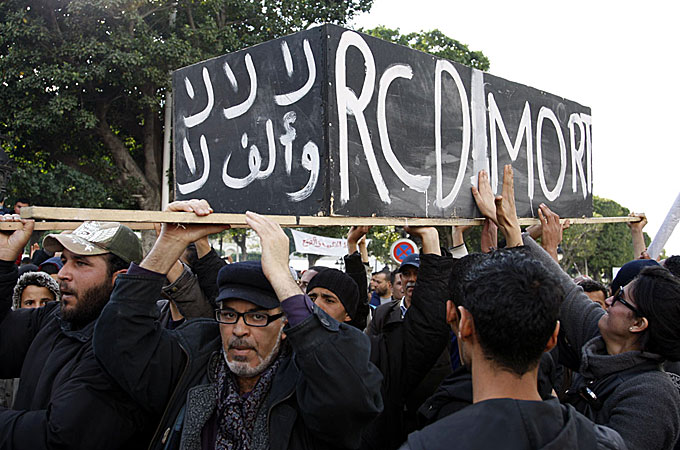Tunisia bans ruling party officials from vote
Members of Ben Ali’s RCD party, which ruled until protesters forced them from power, are banned from the July election.

 |
| Tunisian protesters have demanded the banishing of the RCD from political life [EPA] |
Senior members of Tunisia’s former ruling party in the past 10 years will be barred from standing in elections on July 24, Beji Caid Esebsi, the country’s interim prime minister, has announced.
The time limit was cut from the 23 years that some groups had asked for, following the ouster of Zine El Abidine Ben Ali, who had been president since 1987 until he was toppled by a popular uprising in January.
Ben Ali’s Constitutional Democratic Rally (RCD) party was regarded as a pillar of the increasingly corrupt and repressive regime he led in the north African country, which has been replaced by a transitional government.
“After reflection, the government has adopted a 10-year limit. We decided that 23 years was not logical. There are officials of the RCD who were repressed by the former regime,” Caid Esebsi said on Tuesday.
A high commission entrusted with preparing the election of a constituent assembly decided by a majority – after a heated debate – on April 12 that any RCD member from the full 23 years of Ben Ali’s rule should be banned from future office.
Caid Esebsi said that to get round this obstacle, Foued Mebazza, the interim president, would draw up a “list by name” of people who directly collaborated with Ben Ali, particularly in his presidential cabinet and among his close advisers.
This list will eventually be published, Caid Esebsi said.
The chairman of the high commission, Yadh Ben Achour, said that only certain former officials in the RCD would be barred from becoming candidates to the constituent assembly.
Ben Achour last week told the French daily Le Monde that the decision “directly targets only members of the executive council, the central committee, the general secretaries of co-ordination committees and the heads of local party cells”.
The RCD, which has become the symbol of the former regime, was formerly dismantled by Tunisia’s high court in early March, when a judge ruled that it would be disbanded and its funds seized.
An advisory council set up after Ben Ali was overthrown had recommended the ban on top RCD members from the election, but it has only now become policy.
Men-women parity
Caid Sebsi confirmed that the transitional government supported mandatory parity for men and women on the electoral lists for the vote in July, with regulations to ensure that women were placed on the lists in positions where they could get elected.
“This is a revolutionary proposal. The chance for women to succeed in the coming elections is guaranteed, like for men,” Caid Esebsi said.
Under pressure from protesters to ensure reform, he also stressed that the transitional government had made progress in addressing the alleged abuses of the previous regime, despite initial difficulties.
“The first two committees have carried out considerable work in spite of the difficulties, including bribery and corruption cases brought before the Truth Committee, and after lengthy proceedings have delivered verdicts,” he said.
Ben Ali won nearly 90 per cent of the vote in the last presidential election in 2009 – slightly down on his margin of victory five years earlier. Tunisia’s main opposition figures did not contest a poll they dismissed as a farce.
The Organisation for Security and Co-operation in Europe, Europe’s main rights and security watchdog, says Tunisia has made a good start in its transition to democracy but faces a challenge to meet people’s expectations of rapid progress.